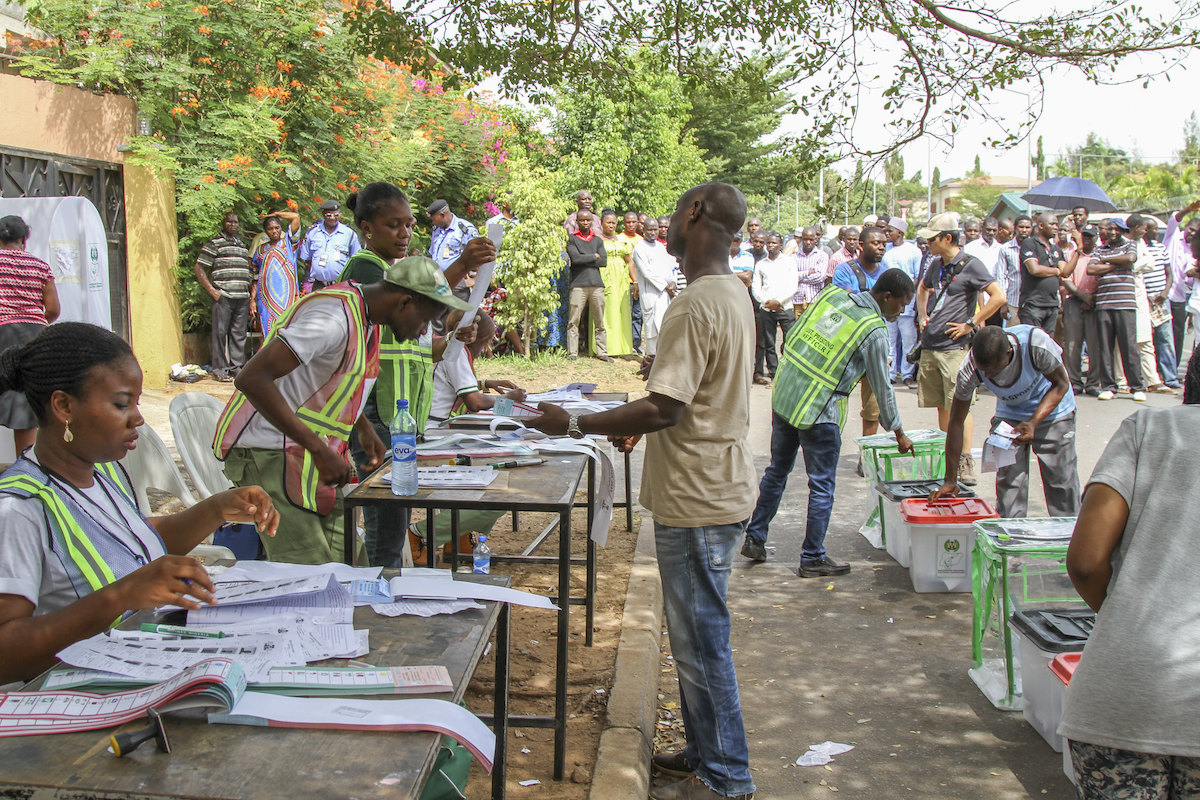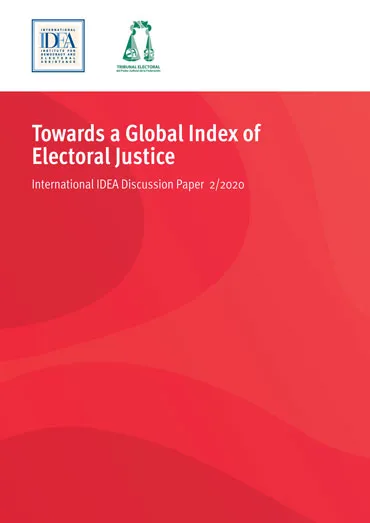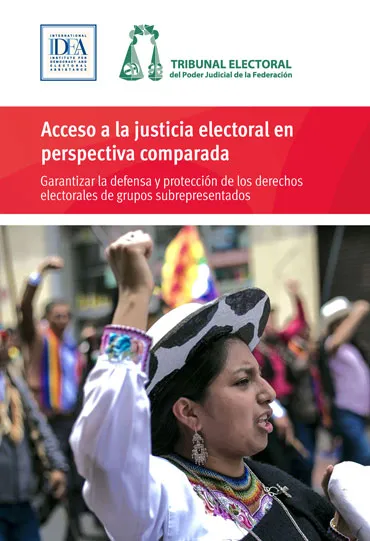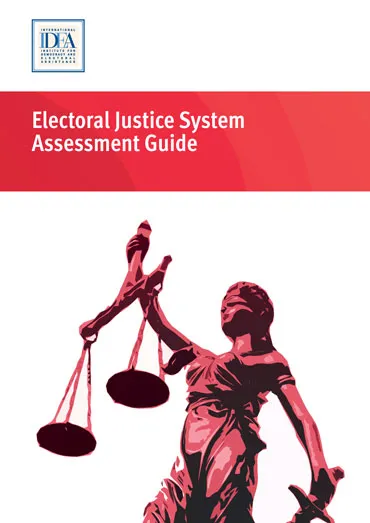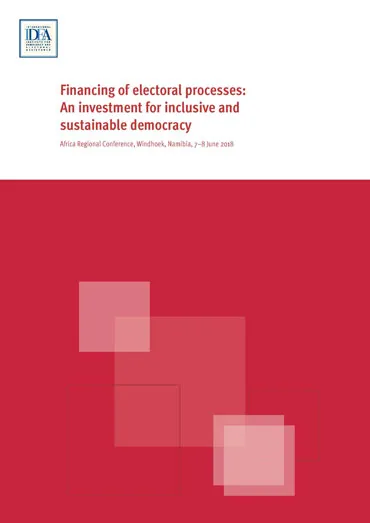| Ad hoc EDR system | An EDR system that involves an ad hoc body derived from a provisional or transitional arrangement. This might be created either with international involvement, or as an internal national institutional solution. The key characteristic of this type of EDR system is its provisional or transitional nature: the ad hoc body is tasked with the resolution of the challenges arising from a specific election or series of elections held over a given period. The body itself may be legislative, judicial or administrative in nature |
|---|
| Adjudication | The legal process of resolving a dispute. The formal giving or pronouncement of a judgement or decree in a court proceeding, which also includes the judgement or decision given. The entry of a decree by a court in respect to the parties in a case. It implies a hearing by a court, after notice, of legal evidence on the factual issue(s) involved. |
|---|
| Administrative challenges | Those challenges that are resolved by the EMB in charge of directing, organizing, administering and overseeing election procedures. Through such a challenge, those affected may oppose an electoral action or decision using a procedure in which either the same organ of the EMB that issued the action or decision being challenged or another of a higher rank decides the dispute. |
|---|
| Alternative dispute resolution (ADR) | A means for disputing parties to come to an agreement short of litigation. ADR is generally classified into at least four types: negotiation, mediation, collaborative law and arbitration. (Sometimes a fifth type, conciliation, is included as well, but for the present purposes it can be regarded as a form of mediation.) ADR can be used alongside existing legal systems, or as a result of mistrust in the conventional system. |
|---|
| Alternative electoral dispute resolution mechanism (AEDR mechanism) | AEDR mechanisms may exist alongside formal EDR mechanisms or come into being on an ad hoc basis or during exceptional circumstances. They provide for one or more parties to a conflict to initiate a process to resolve it, unilaterally, bilaterally, or through a third party or agency. In the latter case, the equivalent judicial mechanisms are conciliation, mediation and arbitration. |
|---|
| Alternative electoral dispute resolution (AEDR) | Bodies/institutions and/or mechanisms that operate outside the legally established EDRBs and/or system which handle, deal with and/or settle disputes related to electoral processes. These are usually informal/traditional bodies and/or mechanisms, such as ad hoc committees for the supervision of compliance with codes of conduct, traditional dispute resolution mechanisms, non-governmental/civil society organizations, etc. |
|---|
| Annulment | Making void. There are three types of annulment: the annulment of a single ballot; the annulment of the votes received at a particular polling station; and the annulment of an entire election. |
|---|
| Appeal | A request made to a higher EDRB to confirm, reverse or modify a decision made by a lower EDRB. |
|---|
| Arbitration | - Binding voluntary arbitration: A process in which the disputing parties choose and agree a neutral person to hear their dispute and resolve it by making a final and binding decision or award. Arbitration is an adversarial, adjudicative process designed to resolve the specific issues submitted by the parties. Arbitration differs significantly from litigation in that (1) it does not require conformity with the legal rules of evidence and procedure, (2) there is flexibility in timing and choice of decision makers, and (3) the proceeding is conducted in private rather than in a public forum. Binding arbitration awards are usually enforceable by courts, so long as there are no defects in the arbitration procedure.
- Mandatory non-binding arbitration: This form of arbitration follows from court proceedings. Court-appointed arbitrators hear cases subject to jurisdictional limits set out in the relevant legislation and regulations. The losing party has the right to a new trial (trial de novo) in the trial court.
|
|---|
| Arbitrator | An attorney or other person selected to hear a case and settle a dispute without a formal trial, through a process of arbitration. |
|---|
| Boundary delimitation | The process for determining the way in which constituency or electoral area boundaries are drawn; it deals with the division of a country into electoral districts and the allocation of electors to electoral districts and polling sites. Sometimes called districting or boundary demarcation. Also known as delimitation. |
|---|
| Campaign (electoral) | Any form of political activity aimed to promote support for a candidate, political party or choice available to voters in preparation for an election or a direct democracy instrument during a defined campaign period, including meetings, rallies, speeches, parades, broadcasts, debates and other events, and the use of the media, the Internet or any other form of communication. |
|---|
| Campaign financing | Funding of a political campaign (with monies received through fundraising, contributions, etc.). |
|---|
| Candidate | A person who is nominated to contest an election either as a political party representative or independent of any political party’s support. |
|---|
| Certification of results | The formal endorsement and confirmation of the announcement of electoral results. |
|---|
| Civic education | An information and/or educational programme which is designed to increase the comprehension and knowledge of citizens’ rights and responsibilities. |
|---|
| Civil law | Law based primarily on codified legislative texts found in constitutions or statutes. The secondary part of civil law is the legal approaches that are part of custom. |
|---|
| Civil law system | A legal system based on civil law and derived from the principles of the legal code of ancient Rome. In civil law jurisdictions, judges do not generally have the power to make law by setting legal precedent. |
|---|
| Code of conduct | A set of general rules of behaviour, for example for members and/or staff of an EMB, or for political parties, with respect to participation in an electoral process. |
|---|
| Common law | Law developed by judges through decisions of courts and similar tribunals (also called case law), rather than through legislative statutes or executive branch action. These decisions stand as precedents and the principle of stare decisis applies. |
|---|
| Common law system | A legal system that gives precedential weight to common law on the principle that it is unfair to treat similar facts differently on different occasions. |
|---|
| Complaint | The first document filed with the court by a person or entity claiming legal rights against another. |
|---|
| Conciliation | A method of dispute resolution by means of discussion and settlement without going to court. |
|---|
| Conflict | Competition between opposing forces, reflecting a diversity of opinions, preferences, needs or interests. |
|---|
| Constitutional court | A court concerned with constitutional issues, which may include the constitutionality of laws, procedures and outcomes related to electoral processes. |
|---|
| Corrective measure | Electoral challenges are intrinsically corrective as their effects include the annulment, modification or recognition of wrongful conduct in order to repair the violation that has been committed and restore the enjoyment of the electoral right involved. A corrective measure is taken to clean up the electoral process in such a way that the harmful effects of an irregular action do not continue and reach the point of substantially affecting the results – regardless of any other administrative sanction imposed on the transgressor. |
|---|
| Declaration of results | Oral or written formal public communication of the result of an electoral event. This may consist of the number of votes received by each candidate or political party contesting an election, and of the candidate(s) and/or party(ies) entitled to sit as/seat an elected member(s) under the provisions of the electoral law; or of the number of votes recorded for each of two or more options presented in the use of a direct democracy instrument. |
|---|
| Direct democracy instrument | Instrument which gives citizens the right to be directly involved in the political decision-making process. It may take one of four forms: referendum; citizens’ initiative, agenda initiative or a recall vote. |
|---|
| Elector | A person who is qualified and registered to vote in an election or under a direct democracy instrument. |
|---|
| Electoral administration | The measures necessary for conducting or implementing any aspect of an electoral process. |
|---|
| Electoral administrative infraction | An act or omission by an electoral body or official which contravenes or fails to meet the requirements of electoral laws or procedures but which is not defined by law as a criminal offence. |
|---|
| Electoral challenge | A complaint lodged by an electoral participant or stakeholder who believes that his or her electoral rights have been violated. |
|---|
| Electoral commission | A title often given to an Independent Model EMB or the non-governmental component of a Mixed Model EMB. |
|---|
| Electoral court | Court of justice or other body before which an electoral actor may dispute the validity of an election, or challenge the conduct of candidates, political parties or the EMB. See also electoral tribunal. |
|---|
| Electoral crime | An act or omission defined as a criminal offence, usually through electoral legislation or general criminal legislation. Examples include electoral fraud, voter coercion, impeding or falsifying voter registration, and violations of campaign financing provisions. |
|---|
| Electoral cycle | The full series of steps involved in the preparation and implementation of an election or direct democracy instrument, viewed as one event in a continuing series. In addition to the steps involved in a particular electoral process, it includes post-election evaluation and/or audit, the maintenance of institutional memory, and the process of consultation and planning of the forthcoming electoral process. |
|---|
| Electoral dispute | Any complaint, challenge, claim or contest relating to any stage of the electoral process. |
|---|
| Electoral dispute resolution (EDR) | The process of hearing and adjudication of any complaint, electoral challenge, claim or contest relating to any stage of the electoral process. |
|---|
| Electoral dispute resolution body (EDRB) | The body entrusted with defending electoral rights and resolving electoral disputes. These may be entrusted to administrative bodies, judicial bodies, legislative bodies, international bodies or, exceptionally, as a provincial or transitional arrangement, to ad hoc bodies. |
|---|
| EDR legislative system | An EDR system that vests the power of final decision on the validity of elections, including any challenges brought, to the legislature, one of its committees or some other political assembly. |
|---|
| EDR system | The legal framework within an electoral justice system that specifies the mechanisms established for resolving electoral disputes and protecting electoral rights. These may be entrusted to administrative bodies, judicial bodies, legislative bodies, international bodies or ad hoc bodies. See also electoral dispute resolution body (EDRB). |
|---|
| Electoral justice | In this Handbook, electoral justice refers to the various means and mechanisms for ensuring that every action, procedure and decision related to the electoral process is in line with the law (the constitution, statute law, international instruments or treaties and all other provisions in force in a country), as well as those for protecting or restoring the enjoyment of electoral rights. Electoral justice gives people who believe their electoral rights to have been violated the ability to make a complaint, get a hearing and receive an adjudication. |
|---|
| Electoral justice mechanism (also EDR mechanism) | All of the means in place for ensuring that electoral processes are not marred by irregularities, and for defending electoral rights. Among the mechanisms, a distinction should be made between: (a) those that provide a formal remedy or are corrective in nature (b) those that are punitive in nature; and (c) alternative electoral dispute resolution mechanisms. |
|---|
| Electoral justice system (EJS) | The set of means or mechanisms available in a country (sometimes, in a local community or in a regional or international context) to ensure and verify that electoral actions, procedures and decisions comply with the legal framework, and to protect or restore the enjoyment of electoral rights. An EJS is a key instrument of the rule of law and the ultimate guarantee of compliance with the democratic principle of holding free, fair and genuine elections. |
|---|
| Electoral law | One or more pieces of legislation governing all aspects of the process for electing the political institutions defined in a country’s constitution or institutional framework. |
|---|
| Electoral legal framework | The collection of legal structural elements defining or influencing an electoral process, the major elements being constitutional provisions, electoral laws, other legislation impacting on electoral processes, such as political party laws and laws structuring legislative bodies, subsidiary electoral rules and regulations, and codes of conduct. |
|---|
| Electoral management | The process of execution of the activities, tasks and functions of electoral administration. |
|---|
| Electoral management body (EMB) | An EMB is an organization or body which has been founded for the purpose of, and is legally responsible for, managing some or all of the essential (or core) elements for the conduct of elections, and of direct democracy instruments. These essential (or core) elements include determining who is eligible to vote, receiving and validating the nominations of electoral participants (for elections, political parties and/or candidates), conducting balloting, counting votes, and tabulation of votes. |
|---|
| EMB-entrusted EDR system | Under this type of system, responsibility is entrusted to an independent electoral management body which, in addition to taking charge of organizing and administering electoral processes, has judicial powers to resolve challenges and issue a final ruling as to the validity of the electoral process. |
|---|
| Electoral offence | See electoral crime. |
|---|
| Electoral penalty | A punitive measure following an electoral offence/crime, imposed on the perpetrator, entity or person responsible for the irregularity. An electoral penalty can be either criminal (by conventional punishment) or administrative (usually through financial means) in nature.
A criminal penalty is always imposed by a court. An administrative penalty can in some electoral justice systems be imposed by the EMB. |
|---|
| Electoral process | The series of steps involved in the preparation and carrying out of a specific election or direct democracy instrument. The electoral process usually includes the enactment of the electoral law, electoral registration, the nomination of candidates and/or political parties or the registration of proposals, the campaign, the voting, the counting and tabulation of votes, the resolution of electoral disputes and the announcement of results. |
|---|
| Electoral regulations | Rules subsidiary to legislation made, often by the EMB or the ministry within which an EMB is located, under powers contained in the electoral law which govern aspects of the organization and administration of an election. |
|---|
| Electoral rights | Political rights which are enshrined in the basic or fundamental provisions of a particular legal order (generally in the constitution), in general relating to the political right to participate in the conduct of public affairs, directly or by means of freely elected representatives. The main electoral rights include the right to vote and to run for elective office, freedom of association, freedom of expression and freedom of assembly. |
|---|
| Electoral system | A set of rules and procedures which provides for the electorate to cast their votes and which translate these votes into seats for parties and candidates in the parliament or the legislature. |
|---|
| Electoral tribunal | A judicial institution with specific competence to hear contests and disputes on electoral matters. |
|---|
| Eligible voter | A person eligible to register and to vote in an election or direct democracy instrument. |
|---|
| Evidence | Evidence includes any document, piece of testimony or tangible object presented at a hearing by an EDRB in line with accepted rules of admissibility that tends to prove or disprove an alleged fact. |
|---|
| Filing fee | A legal requirement to pay any fee or deposit as a condition for the submission of a complaint. |
|---|
| Freedom of expression | A universal right protected by the Universal Declaration of Human Rights. Article 19 provides that ‘Everyone has the right to freedom of opinion and expression; this right includes freedom to hold opinions without interference and to seek, receive, and impart information and ideas through any media regardless of frontiers’. |
|---|
| Free, fair and genuine elections - | A free, fair and genuine election emanates from an electoral process which is a real contest where there is full enjoyment of fundamental freedoms and political rights related to elections: freedom of expression, freedom of association, freedom of assembly and freedom of movement. This electoral process is supervised by an impartial electoral administration to ensure that the election is conducted fairly, impartially and in accordance with laws. Opportunities exist for independent scrutiny and access to independent review. There is a legal framework and electors are fully informed of their rights. |
|---|
| Governmental Model EMB | An EMB model where elections are organized and managed by the executive branch of government through a ministry, such as the Ministry of the Interior, and/or through local authorities. |
|---|
| Guarantee | Any legal means or instruments, which are both structural and procedural, by which values, rights or institutions that are protected or established by the legal order on behalf of the voter are assured, protected, supported, defended or safeguarded. |
|---|
| Incompatibility | A limitation in legislation of candidacy for or election to a representative position based on the perceived undesirability of a person who already holds one public position gaining access to or holding another. |
|---|
| Independent Model EMB | An EMB model where elections are organized and managed by an EMB which is institutionally independent and autonomous of the executive branch of government, and which has and manages its own budget. |
|---|
| Infraction | The act or an instance of infringing a legal or administrative provision or regulation. |
|---|
| International challenge | Those legal instruments provided for in international treaties and conventions by which those with the standing to do so may have recourse, on a subsidiary and complementary basis, to the competent body after exhausting the domestic remedies provided. |
|---|
| Judicial challenge | Those procedural legal instruments provided for by law by which two or more conflicting parties bring before a judicial body, that is, a judge or a court, whether or not as part of the judicial branch, a dispute over an alleged error, irregularity, instance of wrongful conduct, deficiency or illegality in a certain electoral action or decision. The judicial body, in its position as a superior third party and as an organ of the state, decides on the dispute in a final and impartial manner. Generally speaking, the various judicial electoral challenges can be classified into trials and appeals. |
|---|
| Judicial EDR system | An EDR system that entrusts the authority to make the final decision on a challenge to a particular election to a judicial body. The body in question might be: (a) regular court of the judicial branch; (b) a constitutional court or council; (c) an administrative court; or (d) a specialized electoral court. |
|---|
| Judgement | The decision reached and promulgated by a judicial body and/ or an EDRB. |
|---|
| Jurisdiction | - The competence and geographic scope of a court or other judicial body in direction-making, decision-making and implementation powers.
- The power or authority of a court to act. The court must have jurisdiction both over the subject matter and geographic area of the complaint and over the person or body against whom relief is sought.
|
|---|
| Legislation | The body of law made by the legislative process, also called statute law. Written laws passed by a Parliament, Congress or other legislative body at national or local level. |
|---|
| Legislative challenge | Those legal instruments provided for in the constitution or statutes of some countries which grant powers to legislative bodies or other political assemblies to formally resolve certain electoral challenges or issue the certification or the final result of an election. |
|---|
| Legitimacy | The perceived fairness of a dispute resolution process. Liability Obligations under law arising from civil actions (torts) or under contract. Legal liability can only be decided by courts even if the settlement is made out of the court by mutual agreement. |
|---|
| Litigation | A judicial contest which seeks a decision from a court. |
|---|
| Lower-level EMB | An EMB formed at any sub-national level, for example a province, region, district or commune. |
|---|
| Mediation | A process in which the disputing parties use a third party to assist them in reaching a settlement of a dispute though a process which is private, informal and non-binding. The mediator has no power to impose a settlement, but attempts to assist the disputants in reaching consensus and agreement on a mutually acceptable resolution to the dispute. |
|---|
| Member (of an EDRB or EMB) | A person appointed or elected to serve on the body or committee which directs the conduct and implementation of the powers and functions of the EDRB or EMB. |
|---|
| Mixed legislative-administrative EDR system | A system that combines features of the administrative EDR and the legislative EDR systems, usually through stating that challenges are first heard by the administrative body, and subsequent challenges are heard by the legislative body in question. |
|---|
| Mixed Model EMB | An EMB with a dual structure, which has a policy, monitoring or supervisory component that is independent of the executive branch of government (as for the Independent Model EMB) and with an implementation component located within a department of state and/or local government (as for the Governmental Model EMB). |
|---|
| Observer | A person accredited to witness and assess, but not intervene in, the proceedings of an electoral process. |
|---|
| Offence | A breach of a law or rule; an illegal act. |
|---|
| Party registration | The act of enrolling political parties to participate in elections on the basis of eligibility criteria and submitted signatures and deposits. |
|---|
| Personation | The fraudulent casting of the vote of a registered elector by another person by a person pretending to be the registered elector |
|---|
| Polling station (or polling site) | A venue established for the purpose of polling and controlled by staff of the EMB. Also called a voting station. |
|---|
| Precedent | A legal principle which future courts of law are bound to follow in making decisions. The law is based on the principle of precedent and stare decisis. Thus if a court, particularly a lower court, comes across a similar fact or situation it is obliged to follow the legal principles established in the earlier case when making a decision on the case currently before it. |
|---|
| Punitive measure | A punitive measure does not correct or annul the effect of an electoral irregularity. It punishes either the person who committed the violation or the person responsible for ensuring that the violation does not happen, through either the electoral administrative law, which imposes the sanctions, or the electoral criminal law. |
|---|
| Recall | A direct democracy instrument that allows a specified number of citizens to demand a vote of the electorate on whether an elected holder of public office should be removed from that office before the end of his/her term of office. |
|---|
| Recount | A recalculation, in full or in part, of the votes cast in an election or direct democracy instrument. |
|---|
| Referendum | A direct democracy instrument consisting of a vote of the electorate on an issue of public policy such as a constitutional amendment or a bill. The consequences of the vote may be either binding or consultative. |
|---|
| Registered voter | An eligible voter inscribed in an official list or register of electors. |
|---|
| Registration of political parties and candidates | The act of reviewing the validity of applications to participate in an election of political parties and candidates and accepting those that meet defined criteria. |
|---|
| Registration of voters | The act of entering the names of eligible electors and other relevant information in a register or list of electors. |
|---|
| Rule of law | Rule of law generally entails equal protection of the human rights of individuals and groups as well as equal punishment under the law. It reigns over government and protects citizens against arbitrary state action, ensuring citizens are subject to the rule of law, not the arbitrary rule of men. It encompasses three institutions: the security or law enforcement institution, the court system and judiciary, and the correction system.
The principle that law should ‘rule’ in the sense that it establishes a framework within which all conduct or behaviour takes place. |
|---|
| Sanction | Measures taken by an institution in response to non-compliant or unacceptable behaviour. |
|---|
| Seat allocation | The process of distributing the seats of a legislative assembly to the political parties or candidates on the basis of the number of votes they have obtained. |
|---|
| Specialized electoral court | A court that specializes in electoral matters. The authority of this court varies depending on the EDR system in the country in question. |
|---|
| Stare decisis | A principle of legal decision making that provides that a previous judicial decision must be followed in identical circumstances. |
|---|
| Statute | See legislation. |
|---|
| Tabulation | The process of compiling the result of counting of votes cast in an electoral process. Also known as amalgamation of results. |
|---|
| Transitional EMB | An EMB which is set up temporarily to facilitate transitional elections. It is normally set up under the auspices of the international community, such as the UN, and may consist of or include international experts as members. |
|---|
| Trial | In law, judicial examination or hearing of the facts and reaching judgement in a civil or criminal case. |
|---|
| Universal suffrage | The extension of the right to vote or participate in a democratically elected government to all adults, without distinction as to race, sex, belief, intelligence, or economic or social status. |
|---|
| Voter education | A process by which people are made aware of the electoral process, including the particulars and procedures for voter registration and voting. |
|---|
| Voter registration | The process of establishing the eligibility of individuals to cast a ballot in an electoral process or direct democracy instrument and inscribing eligible individuals on a register. As one of the more costly, time-consuming and complex aspects of the electoral process, it often accounts for a considerable portion of the budget, staff time and resources of an election authority. |
|---|
| Writ of certiorari | A writ that a superior appellate court issues at its discretion to an inferior court, ordering it to produce a certified record of a particular case it has tried in order to determine whether any irregularities or errors occurred that justify a review of the case. |
|---|

